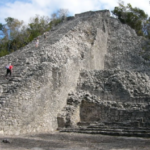The Czech Republic is gay friendly. In Prague the scene is both easy and difficult to find. Easy: Go to the Club Heaven accommodations and book a room. 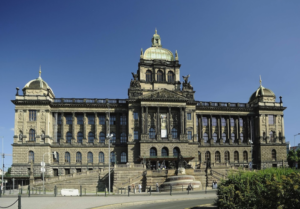 The price (double US$60) is modest for nice digs with private bath, spacious room with heated floors, TV/DVD, lots of lights. The cost includes admission and a tour of the other half of Heaven next door: a walk through dark rooms with videos, a lounge, a bar and a tiny theatre for viewing hard core flicks. Not exactly Academy Award stuff but it serves the purpose. (photo right, National Museum)
The price (double US$60) is modest for nice digs with private bath, spacious room with heated floors, TV/DVD, lots of lights. The cost includes admission and a tour of the other half of Heaven next door: a walk through dark rooms with videos, a lounge, a bar and a tiny theatre for viewing hard core flicks. Not exactly Academy Award stuff but it serves the purpose. (photo right, National Museum)
Our guide through this erotic labyrinth was Jurka, one of the managers who also checked us into our room and was very helpful to explain things. Before going off to accommodate other arriving guests (he said most LGB visitors are from Italy and Germany) Jurka gave us the bi-monthly magazine ‘Gay Kontact’ (no website) a glossy magazine that does what its title says. Inside are 60 pages of news, editorials, interviews, feature stories, travel articles, venue reviews, scene and entertainment news, health commentaries, biographic sketches, film reviews, sexy fashion spreads and a wide selection (with a map) of clubs, discos, saunas, restaurants, sex shops—including the one exclusive lesbian bar Jampa Dampa. Gay Prague at our fingertips–easy.
Difficult: What was missing was a listing for any advocacy group. Jurka described why. There is little political or activist scene in Prague, no LGBT center, no big gay pride parade although there is a modest annual lesbian festival called the ‘NOT ONLY Lesbian Cultural Festival’. This was a surprise since Prague is one of the most pro-gay cities in Europe!
But, Jurka went on the say, this is not because of repression or being banned. “It’s because here everything is legal. No gay activity is illegal, except for violence, drugs or under-age activity. There is nothing to fight for. Here you can register your relationship, which is the same as getting married. You can walk down the street holding your boyfriend’s hand and no one will say a thing.”
Indeed, the largest and most active LGBT rights organization Gay Initiative, headed by Jiri Hromada, closed last year having declared its work finished with the legalization of LGB couples in Czech. Jiri recalled in an interview that in 1990 only ten percent of Czechs tolerated homosexuals contrasted with seventy percent in 2008, according to the polls. Hromada finished his work when the group felt that it had achieved its goals.
He said, “our goal from the start in 1990 was not to be needed. We had achieved what we set out to do and now it was time for the younger generation to take over and fight for their own needs… One of the reasons I accepted the nomination (for parliament) was to prove to others that sexual orientation is not important and that people should judge others by their capabilities.”
A Liberal Country
The Czech Republic is clearly more liberal and advanced for gays than its neighbors to the east like Poland or the Baltic States to the north or Balkans to the south. There are more than 50 LGBT venues listed in Kontact magazine as well as in the separate ‘Gay Prague’ map available free to visitors. (photo right)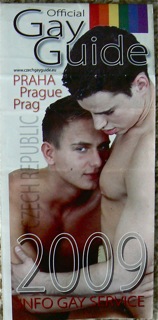
Homosexuality was decriminalized in 1962. The age of consent was equalized in 1990 (at 15). The Army doesn’t question the sexual orientation of soldiers, and allows homosexuals to serve openly. Homosexual prostitution was decriminalized in 1990 so Czech has its share of hustlers who inhabit some gay clubs looking for ‘take-out’ service. Others ‘workers’ prefer the city streets or highway gas stations dressed in tight white T-shirts.
In 2006 the government legalized civil unions for gay couples with most of the rights of marriage. The lead advocate for the decision was Tereza Kodíková. (photo below)
 In an interview Tereza said: “The Czech Family Act says the main cause for marriage is to raise children. There are also many other justifications for marriage, such as mutual economic, social, psychological support that people give to each other. That’s one thing. There are many childless marriages and they have not been cancelled because there haven’t been any children.
In an interview Tereza said: “The Czech Family Act says the main cause for marriage is to raise children. There are also many other justifications for marriage, such as mutual economic, social, psychological support that people give to each other. That’s one thing. There are many childless marriages and they have not been cancelled because there haven’t been any children.
“The other thing is that many gay couples do raise children, be it from previous marriages or from the current relationship they live in. So this argument doesn’t work either. I also know that there are people who have been through the Communist times and they see this as the country saying – OK, we now take you as fully-fledged citizens and we do accept you for this.”
Another poll conducted in December 2007 found that the Czech public favored same-sex marriage at 52%, above the European Union average of 44%, which makes full same-sex marriage likely in the near future.
How has this happened?
Especially considering the official anti-gay attitude of the Soviet Union during the long Cold War and the repressive control it exerted over its captive East European satellites?
Oddly, homosexuality was first decriminalized in 1962, well before the end of communist rule in Czech-Slovakia. Not that it was supported and open in Prague but there was a ‘healthy’ community that thrived discretely along the edges of society. The Russian’s had tens of thousands of soldiers here, far from their girlfriends and wives. Although women here were available for a price, Mr. Stalin and Mr. Brezhnev paid soldiers very little and prostitutes were more expensive than vodka and gay sex. 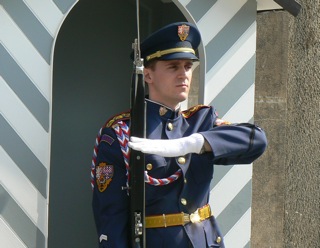
The term MSM applied then as well as now. Getting a blowjob or screwing a queer by a was a delight for both. Not to mention the many ‘normal’ gays, often older couples and singles, who lived their lives as ordinary citizens–restaurant owners, physicians, musicians, artists, politicians, soldiers, accountants or teachers.
(photo left, guard at Prague Castle)
An important framework for understanding the attitude about sexuality was that communism was much more anti-religion than it was anti-gay. Gays did not threaten the socialist state nearly as much as religion could, especially Roman and Eastern churches with their millions of spiritual followers. So for 44 years, 1945-1989, there were no (perhaps a few but not in public) moralists preaching homophobia from the pulpits or Bible-thumping fundamentalists distorting scripture against “abominable” gay people.
Organized religion has almost always been the enemy of personal sexual freedom so without that heavy opprobrium the Slavic Soviet states developed a laissez-faire attitude toward sexuality. As a result today, even twenty years after the Soviets departed with their secular moralism and the weak return of Christian moralism it is a not uncommon to find today a relaxed ‘bisexual moralism’ in the Czech and Slovak population.
This is why, say some observers, that so much pornography has come out of Eastern Europe. “Czech and Slovakia are linked to the West by two strong ties—sex and money. The West wants sex and the East wants money so it has become a lucrative trade that satisfies both, and many young people without professions are not reluctant to sell their bodies (in film) for a profit. They don’t have much guilt about it,” said Alex, owner of the gay Alex Bistro in central Prague. (Curiously, the two biggest (mostly straight) porno exporters are South Korea and China where sexualitiy is supressed.)
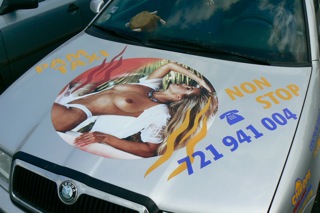 As if to re-enforce the point of this open-mindedness or indifference toward carnal matters, one day at the huge family-oriented Tesco supermarket in Olomouc (Czech’s fourth largest city), among hundreds of other cars, a station-wagon taxi parked next to us. Splashed across the front hood and rear door were two large decals of a young nude blonde woman leaning back to expose her bare-breasted assets (not lacking in size) underneath which were the taxi name and phone number. It was a perky colorful reminder of the attitude here toward such matters. (photo right)
As if to re-enforce the point of this open-mindedness or indifference toward carnal matters, one day at the huge family-oriented Tesco supermarket in Olomouc (Czech’s fourth largest city), among hundreds of other cars, a station-wagon taxi parked next to us. Splashed across the front hood and rear door were two large decals of a young nude blonde woman leaning back to expose her bare-breasted assets (not lacking in size) underneath which were the taxi name and phone number. It was a perky colorful reminder of the attitude here toward such matters. (photo right)
Needless to say, it was a woman being used for the ad since women are far more sexually objectified and exploited by advertising men in the public domain such as porno, fashion and advertising. In countless tobacco stores and street newspaper kiosks there are ‘girlie’ magazines—perhaps 20 or 30–on sale and not in plastic wrappers. Curiously, this observer did not see one male magazine.
A gay couple we met in Prague with an ‘affair de coeur’ with Prague (back for their fifth visit) added their understanding of this issue by saying, “during the communist rule, people hated the repression imposed on them by the rude Russians—really hated it. So they know what discrimination is from the inside; they feel they escaped from hell and the attitude is that no one should have that again. Of course there are people who don’t like homosexuals (skinheads have begun to appear) but the general feeling is that no one should be persecuted. That’s why they have now registered domestic partnerships with every right of married straights.”
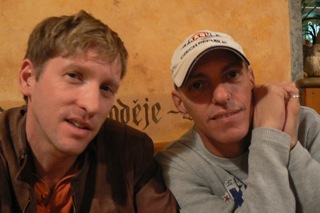 Legalization of same-sex couples happened in 2006. The actual ‘ceremony’ is done by a civil functionary after the couple fills out a form, shows their IDs and listens to a short talk about the rights, obligations and responsibilities of the registration (money, property, etc) then pays a small fee. The clerk then stamps the registration papers—and it’s done.
Legalization of same-sex couples happened in 2006. The actual ‘ceremony’ is done by a civil functionary after the couple fills out a form, shows their IDs and listens to a short talk about the rights, obligations and responsibilities of the registration (money, property, etc) then pays a small fee. The clerk then stamps the registration papers—and it’s done.
So armed with this legal status, one would think there are many stable long-term relationships in the cities of Czech. But not really, said Alex: “men are hunters and it’s not easy to tame a man to stay home and be monogamous…” He quoted an Italian study that revealed that only 55% of married men were sexually faithful to their spouses—and the percentage would likely be lower in Czech.” So there are many couples, gay and straight, to be sure but you could say they are “together and open versus real couples”, said Alex.
Current Scene in Prague
We first found Alex busy in the kitchen of his chic cafe-restaurant Alex Bistrot not far from the heart of Prague on Jecna Stret. Italian by birth, he has lived in the city for seven years after having tasted London and Paris. “This is a much smaller and more comfortable place,” he said one day over lasagna and salad at his cafe. “It’s easier to know people because you see them more often.” Open and friendly he described the gay scene in Prague as “comfortable, not hard like in big cities.”
In conversation with Alex, he considered the current gay male sex scene in Prague. He said there is no question that the ‘volume’ of the scene is not lacking in the city. After only a few days any visitor would fully agree.
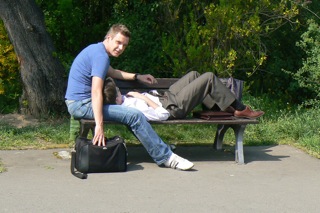 After years of living here he has no complaints about the wide variety of LGBT social and entertainment places as well as the behind-the-scene friendship networks that exist among LGBT citizens. “If you are a gay man or woman and come here you will not be alone for long. If you want immediate sexual contact that’s available. Or if you want to develop friends it’s easy because gay people are not afraid here. They extend friendship; they don’t hide it.”
After years of living here he has no complaints about the wide variety of LGBT social and entertainment places as well as the behind-the-scene friendship networks that exist among LGBT citizens. “If you are a gay man or woman and come here you will not be alone for long. If you want immediate sexual contact that’s available. Or if you want to develop friends it’s easy because gay people are not afraid here. They extend friendship; they don’t hide it.”
However, Alex was not entirely pleased with the current scene. “A few years ago sex, drugs and alcohol were cheap to get in Prague. People came here (including the Soviets) to get all three because the country was behind the Iron Curtain. Communism kept prices low with state support, which of course eventually bankrupted the system along with corruption. But no longer, especially sex. The ‘nice boys’ are unwilling to put out for low wages; they now offer themselves as prostitutes at high rates. There used to be an easy, relaxed gay scene (in the bars and clubs) here but now,” Alex lamented, “it’s falling into a commerce system. If you go out to a bar intending to hook up for casual pleasure it’s likely you will be asked for money before you get to your hotel or home.”
He thought Prague was now ‘categorized hunting’ for sex, which was both frustrating and degrading. “Sex should be a way of making friends, not shopping. Compared to Prague the USA or UK or Paris are more ‘open’, that is open to casual sex and friendly exchange.”
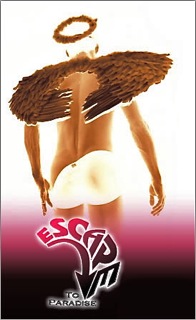 Escape to Paradise is an example of what Alex was talking about; it’s a bar with disco boys dancing in front of customers, performing underwear gyrations, naked body painting and even live oral action on the small stage. While the colored lights focus on the dancers, around the periphery of the lounge, dressed in white, are the available call boys who cozy up to potential johns, asking them to buy drinks and hopefully hire them for take-out services (the range is from US$100 to $250 depending on the action).
Escape to Paradise is an example of what Alex was talking about; it’s a bar with disco boys dancing in front of customers, performing underwear gyrations, naked body painting and even live oral action on the small stage. While the colored lights focus on the dancers, around the periphery of the lounge, dressed in white, are the available call boys who cozy up to potential johns, asking them to buy drinks and hopefully hire them for take-out services (the range is from US$100 to $250 depending on the action).
The night we were there was slow for these ‘merchants’ as they wandered around looking bored, so we chatted with two of them and asked where they were from (Prague, Milan) and what they had in mind for the future. With this second question, Mr. dark and swarthy Milan wandered off but Mr. tall blonde Prague responded, “connections…it’s all about making connections with the right people to get ahead.” He was about to fly to Hawaii for a week with one of his rich johns followed by a stop in Chicago to see another. There was no mention of professional school or developing a skill for use after his current allure faded. By the time that happened he figured he would be rich. Maybe.
Homophobia
Despite the absorption and legalization of a gay population, casual or commercial, and numerous venues and a porno industry, gay and straight, homophobia still exists in CZ Occasionally there is some violence against a gay person and it is handled entirely by the police; there is no LGBT watchdog or advocacy group in Prague to follow up such incidents. Do the police prosecute such cases satisfactorily? Alex had his doubts that all incidents were fully litigated although most were he thought. But police corruption is present in all major cities and officers are always vulnerable to bribes.
Ominously that week in Prague one of the local English language newspapers featured a front-page story about the resurgence of right wing groups who had gained permission to hold a march in a town south of Prague. The local population was up in arms against the event, sponsored by National Party (Národní strana), condemning extremism and neo-Nazism.
Early on the morning of the march protesters strung out yellow police tape along the march route. Attached to the tape were anti-extremist slogans and pictures of victims of holocaust (communist and Nazi). The march did happen (with a police presence) without any disruptive incident but the extremists were made aware of their unwelcome presence.
The same Národní strana in 2006 tried to ban the first gay Pride Rainbow parade in Brno city (organized by rights organizations Holky v Brne, Kluci.info, Gender Information Center Nora, Stud-Brno and Nesehnuti). The event was aimed at reducing the level of homophobia and increasing tolerance among Czechs but it was clear opponents were not listening.
Other ‘Research’ in Prague
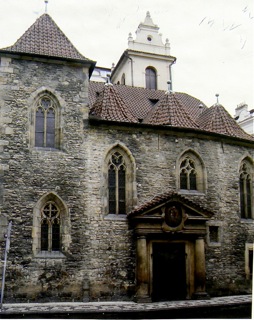 There are a nice variety of LGBT venues in the city, from modest local social bars to the larger booming discos with their dark rooms to the saunas scattered around town. Some of these are notable by their locations: Babylonia sauna, for an unashamed example, is located immediate adjacent to aged St Martin’s in the Wall stone church. This lovely old chapel (photo left) offers frequent classical concerts throughout the year. It’s not unusual to hear the strains of Mozart, Dvorak, Vivaldi or Smetana coming from within, escorting a visitor to the rainbow-colored entry of Babylonia next door, another sort of worship place.
There are a nice variety of LGBT venues in the city, from modest local social bars to the larger booming discos with their dark rooms to the saunas scattered around town. Some of these are notable by their locations: Babylonia sauna, for an unashamed example, is located immediate adjacent to aged St Martin’s in the Wall stone church. This lovely old chapel (photo left) offers frequent classical concerts throughout the year. It’s not unusual to hear the strains of Mozart, Dvorak, Vivaldi or Smetana coming from within, escorting a visitor to the rainbow-colored entry of Babylonia next door, another sort of worship place.
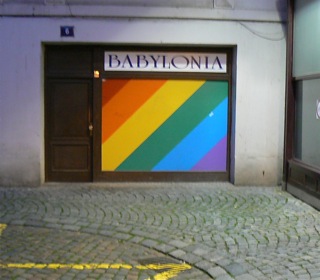 Valentino’s is a major trendy bar or quiet club (daytime) upstairs and, in the cellar at night, a dance floor with thumping disco, a big day and night difference. “Three floors of good atmosphere, lovely staff and kicking nights,” says the pocket guidebook.
Valentino’s is a major trendy bar or quiet club (daytime) upstairs and, in the cellar at night, a dance floor with thumping disco, a big day and night difference. “Three floors of good atmosphere, lovely staff and kicking nights,” says the pocket guidebook.
Cafe Erra is a cozy neighborhood cafe not far from the fashionable main street of Narodni (where the Velvet Revolution began in 1989 that brought down communist rule). Erra’s walls are decorated with cartoon paintings and post cards from around the world; there’s free WiFi (very common all over the country even in small rural pensions), a pet dog wandering around and the usual small klatch of friends talking and laughing.
Friends bar is not far away, located across the street from a police station and next to St Bartholomy church. A few streets away is www.eivo-prague.cz/Eivo, a large restaurant and popular dance club. (Don’t order the duck!) Casa Andina is a polished upscale Chilean restaurant that’s gay owned and close by to the Jewish quarter and the beautifully restored Spanish Synagogue/museum with its glittering mosaics.
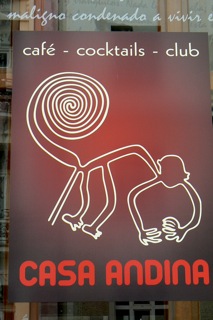 Just off the famous and tourist-plagued Wenceslas Square is Cafe Cafe a highly popular chic eatery with a mixed crowd every day; a bit noisy but it’s the place to be seen. The non-gay Prague in Your Pocket opines thus: “Cafe Cafe attracts the hetero hipsters who look the look, talk the talk and wear the ware.”
Just off the famous and tourist-plagued Wenceslas Square is Cafe Cafe a highly popular chic eatery with a mixed crowd every day; a bit noisy but it’s the place to be seen. The non-gay Prague in Your Pocket opines thus: “Cafe Cafe attracts the hetero hipsters who look the look, talk the talk and wear the ware.”
Finally, a visit to the favored Drakes bar on the ‘left bank’ where entry cost US$10 (which seemed rather steep but since the place has dark room and cubicles downstairs the admission fee tends to keep men from just showing up for darkroom play and leaving without purchasing anything from the bar). A chat with the manager Trevor (from Wales) revealed that Drake’s has been alive for 15 years and is a popular watering hole for foreigners. One of the owners of Drake’s is the famous porno film producer William Higgins who issues a weekly newsletter on his blog. His films are blocked in CZ to protect his models. (Bel Ami has apparently moved to Bratislava.) There are numerous other LGBT venues listed Prague Gay Guide.
Prague 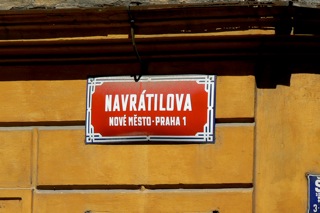 has to be one of the most picturesque and romantic cities of the world with its ancient castle, cobbled streets, enormous cathedral and assorted gothic churches, river walks, puppet theatres and countless restaurants and cafes serving delicious food. But no gay walk around beautiful Prague is complete without passing along the short lane, near Wenceslas Square, named in appreciation of our favorite world champion lesbian tennis player: a street named Navrátilová.
has to be one of the most picturesque and romantic cities of the world with its ancient castle, cobbled streets, enormous cathedral and assorted gothic churches, river walks, puppet theatres and countless restaurants and cafes serving delicious food. But no gay walk around beautiful Prague is complete without passing along the short lane, near Wenceslas Square, named in appreciation of our favorite world champion lesbian tennis player: a street named Navrátilová.
Brno City
Not all the gay action is in Prague. Brno is Czech’s second largest city and contains nearly an equal amount of charm, history and beauty. Well, at least in the old city center. (For all the romance and antique glow of the Czech tourist centers there are much more banal suburban industrial and residential districts that developed during and after communism with its ugly functionalist architecture).
The central old town of Brno is home to Acko gay-owned restaurant, just off the ‘cabbage square’ with it ancient monument and the local theatre where Mozart performed as a teen. In the square is an open-air market offering fruits, vegetables and flowers mostly.
By chance we noticed along one side of the square a handsome young dark haired man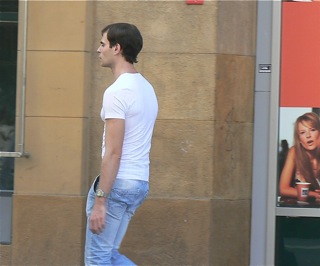 as he strolled through looking around. He was buffed and wore a tight white T-shirt and moderately tight jeans. We had seen him earlier in the central square cruising past the fashionable shops along the cobblestone streets and lanes. His look and style dripped sexuality. To most people he was just walking and looking but for ‘knowing’ others, he was a loner on the prowl looking for a hook-up. And I would guess it didn’t take long given his striking appearance.
as he strolled through looking around. He was buffed and wore a tight white T-shirt and moderately tight jeans. We had seen him earlier in the central square cruising past the fashionable shops along the cobblestone streets and lanes. His look and style dripped sexuality. To most people he was just walking and looking but for ‘knowing’ others, he was a loner on the prowl looking for a hook-up. And I would guess it didn’t take long given his striking appearance.
As the prowler left the square we went along Starobrnenska Street to the Acko restaurant to meet Jan, one of the gay owners who was also our waiter. We ordered the usual pork with red cabbage and potato dumplings. Jan was tall, cheerful and spoke perfect English having been partly raised in Australia. Acko is decorated with playful cartoon paintings and two de regieur male nude posters on the walls further toward the back by the bar.
The clientele are mixed although the place is popular with lesbians as we could easily see. Jan said he has never had any trouble with locals or skinheads in the seven years he has owned the place, which is on the second floor and has an eating balcony overlooking a little courtyard of other shops. He gave us a map of gay venues in Brno and pointed out the best and the closed ones, including the only sauna in town, Las Palmas. A helpful website with photos of the Prague and Brno scenes can be found at Honilek.
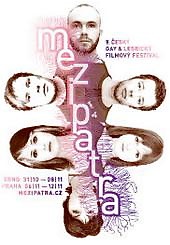 While waiting for our food I called Martin, one of the staff members of STUD-Brno, an activist association of lesbians, gays, and their friends. It organizes Mezipatra (gay and lesbian film festival), has a library and archive, supports LGBT community life and stands for equal rights. There are three primary ‘movers’ in STUD, Martin, Katka (f) and Ales (m). As usual STUD is an all-volunteer group (except for one paid half-time staff member) that focuses its efforts on political and legal issues in CZ.
While waiting for our food I called Martin, one of the staff members of STUD-Brno, an activist association of lesbians, gays, and their friends. It organizes Mezipatra (gay and lesbian film festival), has a library and archive, supports LGBT community life and stands for equal rights. There are three primary ‘movers’ in STUD, Martin, Katka (f) and Ales (m). As usual STUD is an all-volunteer group (except for one paid half-time staff member) that focuses its efforts on political and legal issues in CZ.
In a follow-up e-mail Martin wrote, “last year CZ held it first gay Pride Festival (including a march) in Brno centre, which also included exhibits, parties, film festival and dances during the week. (There is another festival planned for 2009 in the city of Tabor on June 20.) False rumors circulated last year that the mayor of Brno had canceled the Pride event. But Martin said that was not true. The mayor pulled funding only for the gay film festival ‘Mezipatra’. “Even though city support involves only a small proportion of the Pride festival budget (mostly it’s funded by various domestic and international grants) we think the mayor’s effort to stop the cinema funding still stands as a symbolic gesture of intolerance toward the LGBT community.”
One of the important issues that STUD is working on is improving the status of gay partnerships, which are legal and recognized in CZ. The passage of the original law was the effort of a gay-friendly coalition government in 2005 but recently that government received a ‘no confidence’ vote and had to resign 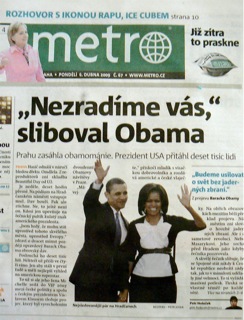 (days prior to the arrival to Barack Obama in Prague for a day of ceremonies and speeches on April 5, 2009.) Now that the government is in transition, gay issues are on the back burner and if the Christian opponents (then and now) have any say about gay rights they will stay in the back. Their claim is that civil partnerships are not constitutional.
(days prior to the arrival to Barack Obama in Prague for a day of ceremonies and speeches on April 5, 2009.) Now that the government is in transition, gay issues are on the back burner and if the Christian opponents (then and now) have any say about gay rights they will stay in the back. Their claim is that civil partnerships are not constitutional.
But STUD is pushing back with lobbying to have CPs written into civil law. The original CP legislation was declared by the government-in-power but not fully legalized in family law by the parliament. Martin said it is not really clear what the legal status of CPs is so they are working to incorporate the unions within the family law statutes. CPs have numerous rights but they are not equal to marriage.
Counter to their work, the district court in the city of Ostrava has reported the first cases of divorces of gay couples. Three lesbian couples have asked the court to cancel their registrations. “Conditions for the cancellation of registered partnerships are much softer than they are for heterosexual marriages,” said one court official without clarifying what he meant.
Other STUD issues are pushing to get anti-discrimination laws passed and bring CZ in full compliance with EU standards, and allowing gay couples to adopt children. Oddly, as it stands, a single gay person can adopt but not a same-sex couple.
Martin said, “I’m sorry, we have no up-to-date English documents about STUD. The name of our organization is abbreviated from “students”. The full name was originally “STUD-LGB” and it meant “LGB students”. But everybody called us just “STUD”, so we decided to use only “STUD”. And we added “Brno” to make it clear, that our organization originates from our city and belongs to it.”
In addition to Acko and Stud there are eight cafes, discos and bars in Brno. There are also ten social organizations that offer a variety of activities and common themes such as lesbian mothers, bicycling, Christians, outdoor events, youth and girls. See GayGuide.
Visit to Las Palmas sauna in Brno
The two most remarkable features of Las Palmas Sauna (entry 350 Kr; US$17) in Brno are its location and its lighting. The location might be bizarre if this were not in CZ. It’s in a very visible neighborhood of hi-rise and low-rise working class suburban condos with moms and baby stroller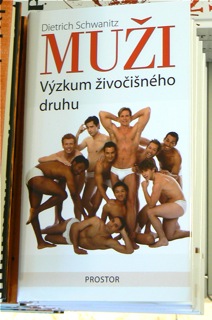 s passing by, kids playing on the grounds and students walking by on their way to school. Like a stump of a sawed-off tree in an otherwise grown forest, Las Palmas’ single-story stand-alone building is made more obvious by its diminutive size among the high-rise towers. A “private club” in a very unprivate location, and undisturbed for nine years, so said David the host/bartender who spoke no English (we used my basic Deutsch).
s passing by, kids playing on the grounds and students walking by on their way to school. Like a stump of a sawed-off tree in an otherwise grown forest, Las Palmas’ single-story stand-alone building is made more obvious by its diminutive size among the high-rise towers. A “private club” in a very unprivate location, and undisturbed for nine years, so said David the host/bartender who spoke no English (we used my basic Deutsch).
As for the lighting, every space and room in Las Palmas is lighted, as if they were offices—including the lizard cage in the locker room. So much for dark and anonymous pleasures. Co-incidental with our arrival, in the lounge/bar a flesh flick was showing on the monitor when the beer deliveryman arrived; unfazed he continued his delivery, checked his invoice with the bartender and left with the empties as if he had delivered his beer cases to a local grocer!
Lesbians
As for the women who love women in Prague, “they are hard to find because they are mostly in the closet” said Alison, a visiting American professor (math and physics) at Prague University who happens to be of lesbian nature. The women’s website provides useful information but it’s in Czech so most Western readers will have difficulty using it.
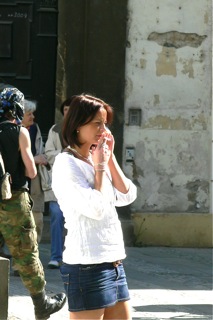 This is not to suggest lesbians have a minimal presence. They very much are active and social, including a Rainbow Festival in May each year (called the ‘NOT ONLY Lesbian Cultural Festival’). It is mounted by eLnadruhou (L2) a registered NGO in Brno city run by and for women that emerged in 2005 after the legendary women’s group Apriles–for 10 years with its Prague LBT festival–announced its closing.
This is not to suggest lesbians have a minimal presence. They very much are active and social, including a Rainbow Festival in May each year (called the ‘NOT ONLY Lesbian Cultural Festival’). It is mounted by eLnadruhou (L2) a registered NGO in Brno city run by and for women that emerged in 2005 after the legendary women’s group Apriles–for 10 years with its Prague LBT festival–announced its closing.
The festival, which is open to all, L2 sponsors an animated film competition. There are also sports events (soccer, football, volleyball), music concerts, dramas and social events. On their website they offer a 48-page English-Czech comprehensive brochure (brozura) pdf about minorities, discrimination, human rights, including LGBT rights, and advocacy.
They list a dozen yet-unfulfilled rights that LGBT people lack such as spousal health benefit, mutual property ownership and child adoption. The group also offers advice and referrals for a range of women’s issues: immigration, recovery, support groups, parenting, fund raising, legal aid and more. Remarkably, the list of referrals offers no less than 37 helping groups!
In the brochure introduction the “Head Manager” Tereza Miksanikova, declares: “As a woman you are all the time a member of the largest minority in the world – 51% of women on the planet is clear evidence. Taking into consideration the
variety of possibilities that a modern individual faces, almost each of us is slowly becoming a member of some minority. And
it is minorities who often become victims of discrimination.”
A favorite cafe for women in Prague is Jampa Dampa. Another place is called Therapy Cafe It is also a primary venue in the ‘NOT ONLY Lesbian Festival’. As well, the Saints bar this year started a Thursday lesbian night.
Links:
The main gay rights movement in the Czech Republic for 17 years was Gay Initiative in Czech Republic (GI) (www.gay.iniciativa.cz) but they dissolved at the end of 2006 after the legalization of same-sex unions. However, there are many actual and active online communities for advocacy and finding contacts. View the links on the left side bar for more information.


